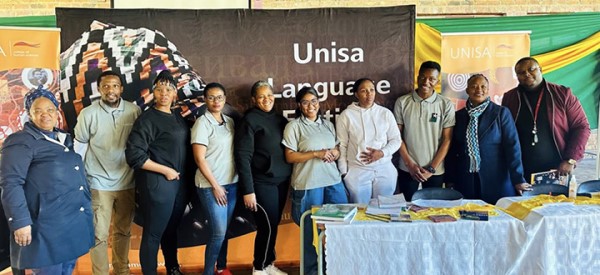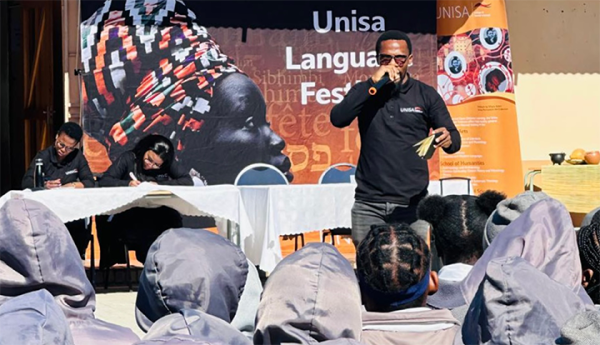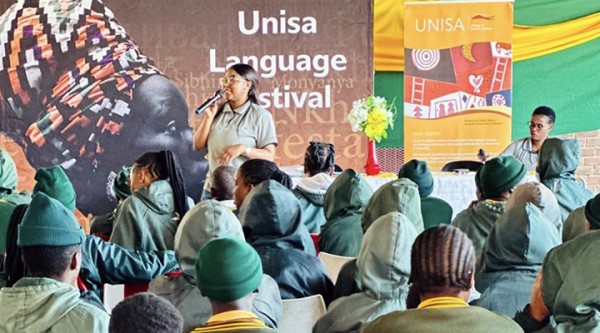College of Human Sciences
Unisa hosts festival in support of marginalised languages
The College of Human Sciences (CHS), in line with Unisa’s commitment to make education accessible to all, enforce transformation in the education sector and address the marginalisation of some of South Africa’s languages, established the Unisa Language Festival.

The Unisa Language Festival roadshow team together with teachers from Tetlano Secondary School in Mahikeng, North West Province
This year, the Language Festival commenced on 16 July 2024 with the team visiting the North-West Province, focusing on twenty rural schools in Mahikeng and Zeerust. The goal was to raise awareness of and foster enthusiasm for multilingualism among learners, educators, school managers and the wider community, and to communicate the importance of learning and preserving South African indigenous languages. The Language Festival roadshow included a competition for students to encourage their active participation in multilingualism.

Jabulani Sibanyoni, Siswati Lecturer in the Department of African Languages, sharing the history of the Unisa Language Festival
The team comprised Palesa Seleke, a Setswana lecturer, and Jabulani Sibanyoni, an IsiNdebele lecturer, both from the African Languages Department, Thabang Masedi and Kitsiso Seete, lecturers from Communications and Media Studies, and Jimmy Mabina, a project manager.

Kitsiso Seete, Public Relations Lecturer in the Department of Communication Science
The event included ten schools from Mahikeng and ten from Zeerust. It featured two categories for learners. The first category involved individual performance, where participants showcased their creativity in poetry, dialogue, monologue, speech and storytelling. In the second category, learners were required to perform as a group, choosing from a play, drama or cultural dance. Each individual performance was allotted three minutes, while group performances had 10 minutes on stage. Participants were encouraged to incorporate more than three languages of their choice into their activities.
The prizes awarded were as follows:
- First place: R3 000 + Tablet
- Second place: R2 500 + Tablet
- Third place: R2 000 + Tablet
- Fourth place: R1 500 + Tablet
- Fifth place: R1 000 + Tablet
The winners in the individual category were as follows:
- First place: Neo Legae (Mpolokang Secondary School)
- Second place: Mthuthuzeni Zwane (Mpolokang Secondary School)
- Third place: Olerato Mogami (Ramotshere Secondary School)
- Fourth place: Dineo Seleke (Ntlatsang Secondary School)
- Fifth place: Kgodane Priyanca (Thlaole Secondary School)
- The winner in the group performance category was Jangjo Secondary School.
Dr Sibongile Mabane, CHS Language Festival Project leader, concluded the roadshow by expressing gratitude to participating schools. "We really appreciated working with you and being welcomed in your communities to learn from each other," she said. She further encouraged teachers and learners to take pride in promoting indigenous languages everywhere they go.
* By Nnana Martina Jege, Communication and Marketing Specialist, College of Human Sciences
Publish date: 2024/10/25

 Unisa co-hosts G20 community outreach in the Eastern Cape
Unisa co-hosts G20 community outreach in the Eastern Cape
 Unisans gain membership of prestigious science academies
Unisans gain membership of prestigious science academies
 Advocating for disability transformation through servant leadership
Advocating for disability transformation through servant leadership
 Unisa Press continues to illuminate the publishing space
Unisa Press continues to illuminate the publishing space